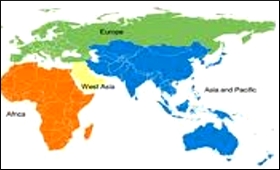|

|
Asia gears up towards a smarter, inclusive digital future
|
|

|
|
| Top Stories |
 |
|
|
|
Saroj Mohanty | 18 Nov, 2013
With information and communication technologies (ICT) gaining wide acceptance as enabler of economic prosperity and sustainable development, key regional and global players in the industry will consider Monday in the Thai capital Bangkok a bouquet of projects that would improve the quality of life in the Asia-Pacific region.
In back-to-back summits over five days, they will seek ways and means of mobilising human, technical and financial resources needed to deploy ICT to eradicate extreme poverty and hunger, achieve universal primary education, promote gender equality and empowerment of women, reduce child mortality, combat malaria, HIV/AIDS and other diseases, ensure environmental sustainability, public safety, and development of global partnerships for sustainable development.
They will weigh the market opportunities in the region which could lead to what the International Telecommunication Union (ITU) calls the 4Ps -- public-private-people's partnerships.
"As ICTs belong to one of the fastest growing sectors, the private sector is thus assured of getting return on investment, while countries will advance their development agendas, and the population will enjoy cheaper and high quality ICT services and applications," says Hamadoun Toure, ITU Secretary-General.
And not far from their conversation would be the strategic question of Internet governance and data protection in the light of the (Edward) Snowden revelations of mass surveillance by the US National Security Agency that have forced the issue into mainstream foreign policy.
Huge amounts of Asian data, key to business and profitability for thousands of companies and start-ups in the region, are said to be stored on US servers, while millions of Asian consumers are hooked on to Google, Yahoo! and Microsoft. But most Asian countries have no means of protecting the digital assets of their citizens and institutions.
China, India, Russia and a number of other countries are calling for a new global entity under the UN to oversee Internet policy and governance, as the Internet has become vital for communication, commerce, culture, research and social connections.
When they meet at the "Connect Asia-Pacific" summit, heads of state and governments, ministers and heads of regulatory authorities as well as CEOs from industry from India and 37 Asia-Pacific countries and international organisations will address the need for robust infrastructure to improve access to ICTs and discuss the critical role of digitisation and broadband in socio-economic development.
M.F. Farooqui, telecom secretary and chairman of the Telecom Commission, is representing India at the Ministerial Roundtable. He will be a key participant at the Multi-stakeholders Meeting and Partnerships.
The delegates will discuss deployment of 3G and 4G networks, migrating from analogue to digital broadcasting, greater bandwidth capacities, convergence of sectors and institutions, as technology is increasingly penetrating every aspect of lives and, above all, securing the vision of a "Smartly DIGITAL (Digital Inclusive Green Innovative Transformative Affordable Living)" Asia-Pacific by 2020.
"The aim is to help build a truly inclusive and sustainable information and digital society, with special focus on those who are disadvantaged, underprivileged or marginalised," says Eun-Ju Kim, ITU regional director for Asia-Pacific.
Many people, she says, are handicapped by low literacy, financial impediments, remoteness, and language. Here ICTs can help overcome the barriers.
Asia-Pacific in recent years has seen one of the fastest growth in ICT, particularly mobile telephony. Yet, 77.5 percent of its people do not have access to Internet. There are also issues of quality and speed.
"The Web has brought innovation to our lives and had a positive effect across the globe, and we need to speed it up by making use of broadband," reasons Toure.
Broadband technology is providing access to opportunities irrespective of geographies. "For India, there is no other option but to rely on technology," avers Reliance Industries Chairman Mukesh Ambani, and that delivery of education, healthcare and means of livelihood can be expedited if the country embraces technology.
Around 700-800 million Indians remained excluded from the India growth story in the last 20 years.
"If we manage to bring this segment into the economic mainstream, it will result in enormous enhancement of India's economic and non-economic power as we will generate equality in access despite inequality in income," Ambani said at an Asia Society gathering in Mumbai on the launch of a book "Reimagining India: Unlocking the Potential of Asia's Next Superpower".
Reliance is investing close to $5 billion in the launch of broadband services in India.
According to the Unesco's State of Broadband 2013 report, a one percent rise in broadband penetration can add $2.7 billion or 0.11 percent to the gross domestic product in 2015.
In the last few years, the ICT sector has undergone a revolution of sorts with the shift to IP-based services. The ITU and experts say there is a need to "understand this change, work out how to grow with it and benefit from it".
The Connect Asia-Pacific summit will be followed up with the Telecom World 2013 summit on the theme of "Embracing Change in a Digital World".
Thought-leaders, major stakeholders and decision-makers from the public and private sectors across the entire industry ecosystem will debate the current transformation of the ICT sector.
During the summit delegates will explore and interact with an exciting array of technologies and applications such as robotics, network virtualisation, 3D printing, and wearable technologies.
|
|
|
| |
|
|
|
|
|
|
|
|
|
|
|
|
|
|
| |
| Customs Exchange Rates |
| Currency |
Import |
Export |
US Dollar
|
66.20
|
64.50 |
UK Pound
|
87.50
|
84.65 |
Euro
|
78.25
|
75.65 |
| Japanese
Yen |
58.85 |
56.85 |
| As on 13 Aug, 2022 |
|
|
| Daily Poll |
 |
 |
| PM Modi's recent US visit to redefine India-US bilateral relations |
|
|
|
|
|
| Commented Stories |
 |
|
|
|
|
|
| |
|